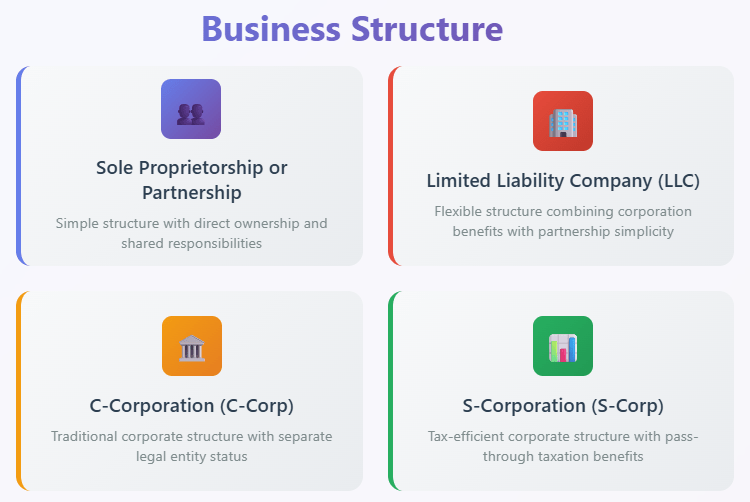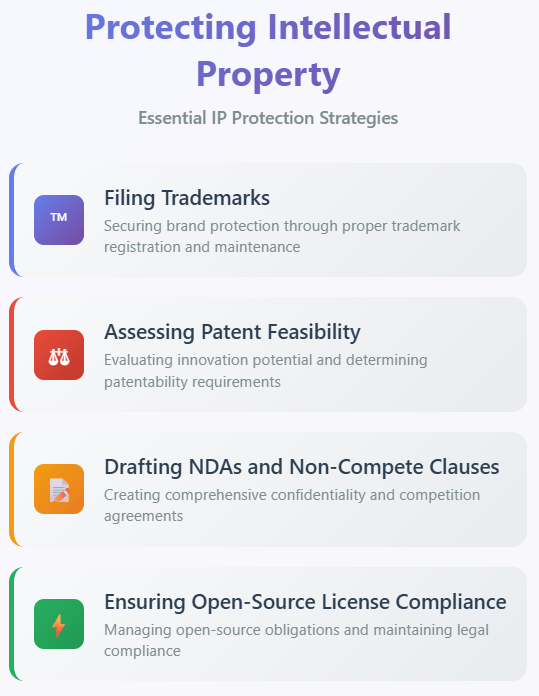Launching a startup is exhilarating—but legal missteps can derail even the most promising ventures. In fact, 65% of high-potential startups fail due to conflict among co-founders, according to Harvard Business School professor Noam Wasserman. Despite this, many founders delay hiring legal counsel until problems surface.
A skilled startup lawyer doesn’t just file paperwork; they help structure your business, protect your intellectual property, ensure regulatory compliance, and position you for clean fundraising. Legal counsel is a strategic ally during formation and continues to guide your startup through scaling, hiring, funding, and even exit planning.
Here’s how startup lawyers add value at each stage of your journey.
1. Choosing the Right Business Structure
One of the first critical decisions founders face is selecting a legal entity. This choice affects liability, taxation, fundraising ability, and internal governance. A startup-savvy lawyer breaks down the pros and cons based on your goals:
- Sole Proprietorship or Partnership: Simple, but founders remain personally liable for business debts and disputes.
- Limited Liability Company (LLC): Offers liability protection with flexible taxation—popular for early-stage startups not yet raising institutional funding.
- C-Corporation (C-Corp): The standard for venture-backed startups. It enables stock issuance, facilitates investment rounds, and supports complex cap tables, though it comes with added regulatory and tax obligations.
- S-Corporation (S-Corp): Limits the number of shareholders but provides tax benefits for small, profitable startups not seeking VC funding.
A lawyer will evaluate your fundraising plans, growth trajectory, and risk profile to recommend the most strategic structure.

2. Drafting Foundational Legal Documents
A startup’s legal foundation rests on a set of essential documents. Properly crafted agreements prevent misalignment and costly disputes down the line. A startup lawyer can draft and review:
| Articles of Incorporation/Organization | Legally registers your business with the state (e.g., a Delaware C-Corp). |
| Bylaws (for Corporations) or Operating Agreement (for LLCs) | Defines how the company will be governed, including voting rights and profit distribution. |
| Founders’ Agreement | Details roles, equity splits, vesting schedules, and protocols if a founder leaves. |
| IP Assignment Agreements | Ensures all intellectual property created by founders or contractors is owned by the company—critical for investor confidence. |
| Shareholder or Investor Agreements | Outlines voting rights, dilution protections, vesting terms, and dispute resolution mechanisms. |
Without these agreements in place, you risk dilution battles, legal uncertainty, or losing control of your own IP.
3. Protecting Intellectual Property (IP)
Your startup’s value often lies in its intellectual assets: software code, branding, designs, or proprietary technology. A lawyer will help:
- File trademark applications for your company name, logo, and product branding.
- Determine if patent protection is possible and file accordingly (software, hardware, biotech, etc.).
- Draft non-disclosure agreements (NDAs) and non-compete clauses for employees and contractors.
- Ensure compliance with open-source licenses — vital for tech startups leveraging third-party code.
Investors place a premium on defensible IP. Startups with patents are significantly more likely to attract investment and exit successfully, according to PitchBook and USPTO-related data.

4. Managing Risk and Regulatory Compliance
Startups must comply with a patchwork of federal, state, and industry-specific laws. Legal counsel can help mitigate risk by:
- Navigating employment law: Drafting offer letters, IP clauses, and properly classifying employees vs. contractors.
- Ensuring securities compliance: Structuring SAFE notes, convertible notes, or equity rounds in accordance with U.S. securities law.
- Addressing industry-specific regulations: Including HIPAA (for healthtech), GDPR/CCPA (for data privacy), or licensing requirements (for fintech and legal tech).
Early legal oversight helps avoid penalties, investor red flags, or retroactive compliance costs.
5. Ongoing Legal Support for Growth
A startup lawyer’s role extends well beyond formation. As your company scales, legal challenges evolve:
- Contract review: Drafting or reviewing customer agreements, NDAs, vendor contracts, and partnership deals.
- Dispute resolution: Mediating co-founder disagreements, handling employee issues, and navigating investor tensions.
- Fundraising preparation: Cleaning up the cap table, structuring stock option plans (ISOs/NSOs), and preparing diligence-ready documentation for investors.
Given that 90% of startups fail, early legal oversight is a high-leverage investment, not a sunk cost.
When to Hire a Lawyer: Startup Legal Timeline
Knowing when to bring in a lawyer is as important as what they do. Here’s a typical timeline:
| Startup Stage | Legal Needs |
|---|---|
| Pre-Incorporation | Entity selection, founder alignment |
| Formation | Incorporation, bylaws, IP assignment |
| Pre-Launch | Trademark filings, employment agreements |
| Fundraising | Securities compliance, cap table review |
| Growth/Scaling | Contract review, dispute resolution, option pools |
Top 3 Legal Mistakes Startups Make
Avoid these common (and costly) missteps:
- Skipping IP assignment: If founders or contractors retain rights, the company doesn’t legally own its core assets.
- No equity vesting or cliffs: Equal splits without safeguards lead to resentment and walkaway risks.
- Misclassifying workers: Treating full-time employees as contractors can trigger audits, back taxes, and fines.

Conclusion: A Lawyer as a Strategic Partner
Engaging a startup lawyer is less about checking legal boxes and more about laying the foundation for a fundable, defensible, and scalable business from the very beginning. Early missteps in entity formation, ownership, or compliance can snowball into serious roadblocks during fundraising or exit negotiations.
By working with a lawyer who understands startup dynamics, you safeguard your vision, avoid costly rewrites, and give investors the confidence that your foundation is solid.
Choose a lawyer experienced in working with startups, not just general corporate law. Look for someone who understands venture capital, equity planning, IP strategy, and rapid growth. Platforms like Lawtrades, StartupLawyer.com, or AngelList can help you find vetted startup attorneys.











